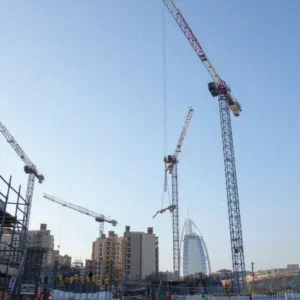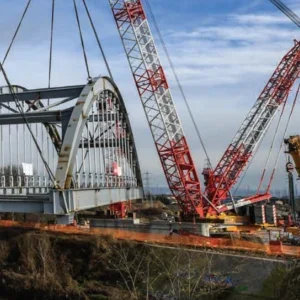In March, US private equity fund Carlyle Group signed another agreement with Xugong Group Construction Machinery Co under which the group would reduce its proposed stake in Xugong to 45% from the previous 50%.

A convoy of a dozen 50-tonne telescopic truck cranes leaving the massive XCMG factory complex in Xuzhou City, Jiangsu Province.
Under the new agreement, Xugong would be 55% owned by Xuzhou Construction Machinery Group (XCMG), which is owned by the city government of Xuzhou, Jiangsu province. Xuzhou would have five seats on the nine-member board of the new entity, while Carlyle would have four.
But as the Chinese government is tightening controls on foreign M&As of SOEs, it remains uncertain whether the latest offer by Carlyle could seal the deal as it has yet to be approved by higher authorities. No financial detail of Carlyle’s latest offer has been revealed. Wang Yansong, vice president of XCMG, only said the price Carlyle offered this time represented an 11% increase compared with the offer it revised last October. This is the second time the US private equity giant has revised its terms of buying into the largest Chinese construction machinery company.
Carlyle’s 45% bid for Xugong is much smaller than its initial target of an 85% controlling stake in Xugong for US$375m (CNY3.029bn) in 2005. It would have been the biggest acquisition by a foreign investor of a controlling stake in a leading state-owned company in mainland China if the deal were done. But the deal raised concerns that China would have sold its key company too cheaply to foreign investors, and that China could lose its technology to foreign competitors.
Among the opponents to the original deal, Xiang Wenbo, chief executive of Xugong’s rival Sany Corp, seems the most radical. Xiang proposed offering a price 30% more than Carlyle’s last June and said the manufacturing industry, as a strategic sector of Chinese industry, should not be monopolised by foreign counterparts.
But Xugong said it would prefer foreign investors. In its first concession, Carlyle signed a revised deal with Xugong last October, under which Carlyle would take a 50% stake for $228m (CNY1.8bn). Still, the price Carlyle offered was immediately questioned by industry experts as too low.
Given the lack of specifics, it is unclear whether the latest deal will win approval from the Chinese government, but the year-and-a-half-long battle for control of Xugong shows that its value has been underestimated and that regulators are keeping a tight grip on foreign M&As in key sectors.
An industry expert who asked not to be named said the saga is a clear example that China has been selling its strategic companies too cheaply to foreign investors.
Xugong is China’s largest construction equipment manufacturer, with 2005 sales of CNY17bn ($2.1bn). According to statistics obtained by Economic Information Daily, Xugong realized a profit of CNY620m ($77.5m) and its net profit reached CNY410m ($51m) in the first three quarters of 2006. Its net profit probably reached CNY500m ($62.8m) last year.
“By a simple calculation, if Xugong is offered to the public and trade at a price-earnings ratio of 20 times, its market value will reach about 10 billion yuan” ($1.29bn), said the industry expert.
Having defended the initial and second price offers, senior management of XCMG kept saying that the prices Carlyle had agreed to pay represented a premium over Xugong’s net asset value. However, analysts said the mistakes Xugong’s senior management had made were partly caused by structural problems in the transfer of China’s state-owned assets to foreign investors.
Chinese Academy of Social Sciences economics professor Zuo Dapei said the understanding of “net asset value” in China’s current accounting system is confusing, which leads to the rapid loss of state assets.
“For example, companies’ brand value and market share are intangible assets, but they are not calculated in our accounting system, which leads to the underestimation of the companies’ asset value,” he said. “Therefore, the net asset value is only a financial concept, which cannot represent the whole enterprise’s value, particularly to brand names,” he said.
Another expert said the senior management of state assets and their lack of supervision of foreign acquisitions are to blame for the loss of state assets.

Yuchun Zhang, the general manager of XCMG subsidiary Chinese Xuzhou Heavy Machinery. (He was erroneously named XCMG chairman Wang Min in “The biggest in the world,” December 2006, p.25).
“Profitability is the main thing people look at in selling their private assets. Given that state assets are not private, senior management might consider many non-economical factors such as their work performance and task of attracting investors in selling the assets,” he said.
As the Carlyle bid also sparked a hot debate about the possible effects of foreign control over leading firms and the possible impact on national economic security, the Chinese government has introduced measures to tighten controls on foreign acquisitions of domestic enterprises.
Last August, the ministry of commerce issued new rules on the acquisition of Chinese enterprises by foreign investors. Under the new rules, which took effect on September 8, the ministry has the right to veto plans for M&As by foreigners.
The rules also require some acquisitions and takeovers to be approved by central authorities if the foreign bidder has a market share of more than 20% and its annual sales in China are more than CNY1.5 billion ($189m), or if the market share of one of the parties to the deal will reach 25% after the acquisition.
The state-owned assets supervision and administration commission and the ministry of finance issued a statement this January that the transfer of state-owned assets to foreign investors should be conducted in open property-rights transactions on public exchanges.
The Carlyle bid has drawn attention to other deals as well, such as French home appliances maker SEB’s plan to take a 61% stake in Zhejiang Supor Cookware, a Shenzhen-listed company and a leading manufacturer of pressure cookers and other kitchenware.
In the annual sessions of the National People’s Congress and the Chinese People’s Political Consultative Conference, delegate Zong Qinghou, chairman of leading beverage maker Wahaha Group, called for greater protection for the private sector from overseas interests, saying that foreign corporate takeovers threatened economic security.
Given that the Xugong deal has been put under the microscope and China might want to use the case to gather more experience for relevant regulations, which needs to undergo a long legislative process, the Carlyle bid could face more challenges.
About the article
This article was originally published by Asia times Online (www.atimes.com) in March.
Yuchun Zhang, the general manager of XCMG subsidiary Chinese Xuzhou Heavy Machinery. (He was erroneously named XCMG chairman Wang Min in “The biggest in the world,” December 2006, p.25). Yuchun Zhang, the general manager of XCMG subsidiary Chinese Xuzhou Heavy Machinery A convoy of a dozen 50-tonne telescopic truck cranes leaving the massive XCMG factory complex in Xuzhou City, Jiangsu Province. XCMG convoy





